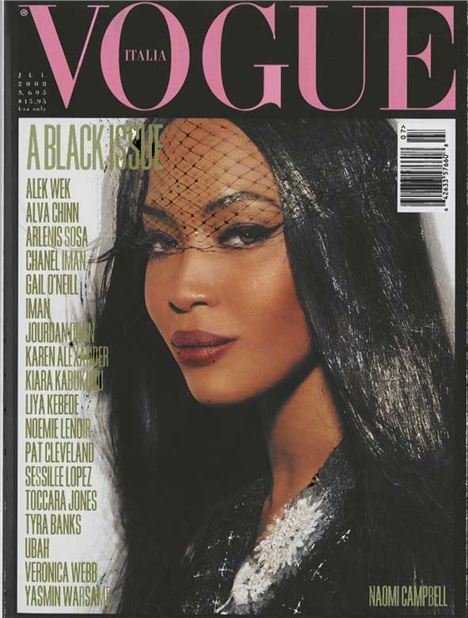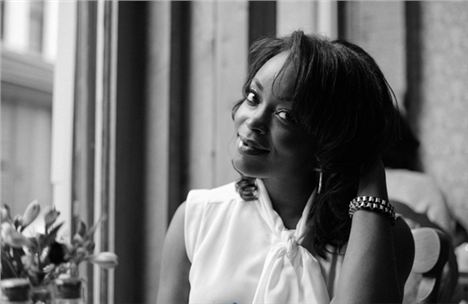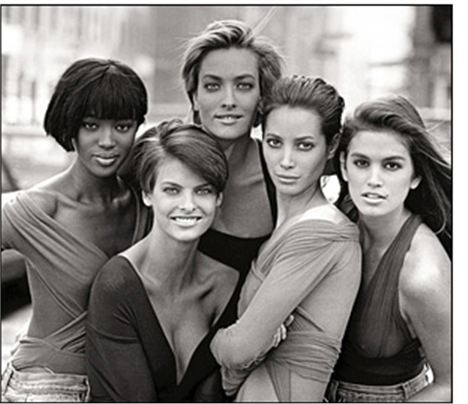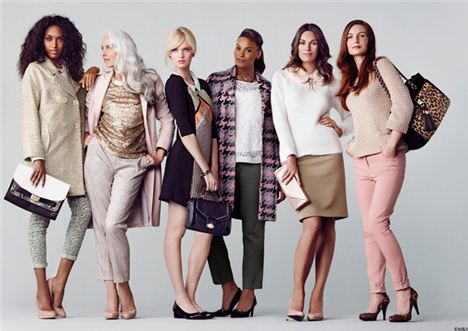ITALIAN Vogue’s 'A Black' issue was unveiled in 2008, the same year Barack Obama became the first black President of the United States.
Accused of riding the coat-tails of Obama’s ground-breaking Change campaign, the issue featured only black models and highlighted one of the fashion industries most controversial debates.
Is the fashion business institutionally racist because of the lack of black models used in campaigns?
It’s sadly a world that isn’t afraid to paint a blonde model brown for an African Queen editorial spread and call it ‘edgy’.
Showered with both criticism and praise, the Black issue sold out in the US and UK in 72 hours, thousands of reprints were called for nationwide and, in an online interview in January this year, self proclaimed risk-taker, Editor Franca Sozzani, called it one of her greatest achievements:
“Nobody wanted to do it, everyone was scared – everyone thought it would be racist as it was all black girls.”
Nevertheless, Franca thought it important to make a statement.
“You go on the runway, you see all these girls and they all come from the East Side, I could not believe that Africa, which is such a big continent, could not have lots of beautiful girls...”
I got my copy of the infamous issue.
A friend sent it me straight from Milan along with a simple note: “You will love this.”
I really did.
Remembering the 1990s, during the height of the Supermodel era, I, a gangly pre-teen who was careering rapidly to a lofty 5ft10, marvelled at the likes of leggy models Claudia Schiffer, Cindy Crawford and Linda Evangelista for their other-worldly beauty; yet it was a certain Naomi Campbell that struck my attention and curiosity.
Naomi, black British of Caribbean decent, looked a little more like me.
Unknown to myself at the time, Naomi Campbell and other beauties such as Tyra Banks, Iman, Beverly Johnson and notably, Alek Wek, were breaking a pretty sturdy mould in an industry that was and still is marred by a shocking degree of discrimination and ‘black face’ scandals.
It’s sadly a world that isn’t afraid to paint a blonde model brown for an African Queen editorial spread and call it ‘edgy’.
Today their modelling predecessors are still reporting about the industry’s 'lack of diversity' and some designers, advertisers and magazines are cautious to use minority ethnicities on major campaigns.
That’s not an assumption either.
Renowned photographer of the Black Issue, Steven Meisel, sadly reported that his advertising clients have refused the use of a black model for fear consumers would 'resist the product' and that a black face 'won’t sell'.
Even recurring faces of big time brands such as Victoria Secret, Rimmel and Yves St Laurent, Jourdan Dunn and Chanel Iman, have both recently spoke out about 'racism' in the industry and both have heard these resounding words from clients, 'we don’t need any more Black girls'. (Jourdan Dunn’s interview with Jonathan Ross)
Melissa Drummond, founder of new Manchester based modelling agency, Cliché Model Management, is all too aware of discrimination in the fashion business.
“I did modelling and found it to be very limited in what I was being put forward for.” she told me.
As a black British model, Melissa felt typecast for 'street wear' roles and felt some agencies were merely filling an ethnic quota.
“In my experience, it was in terms of, oh I need a black girl so you’ll do. Or I would apply to other agencies and they would say, we already have one black girl. Maybe I wasn’t suitable for their agency but I felt it was more to do with race”
Setting up Cliché Model in Manchester in July 2012, Melissa, who claims to have been “championing diversity throughout her career” wanted to create an agency that was more inclusive than exclusive. With a focus on representing models of all ethnicities, Cliché Model management is an agency intent on making a difference.
“I thought there was a gap in the market, in terms of representing women of colour, especially in the North West. Manchester’s a great city and there’s so much going on in terms of culture, and what we’ve got to offer, so one day I just decided to start a modelling agency.
“Honestly I thought that I would just have black girls in it but then I thought that’s not really promoting diversity and that’s not what I’m trying to say.”
Fashion is not known for being the champions of diversity the same way Melissa is.
Where Western society often tries to be the beacon of multicultural harmony, one of its leading and most profitable businesses seems to be decades behind in the entire diversity struggle.
Ask anti-size zero campaigners.
To put it lightly, Fashion isn’t deep.
Amazonian, thin, ethereal good looks are the prerequisites to forming a successful modelling career, whether some like it or not. We’re led to believe that’s just the business.
However, when it comes to the subject of race, Melissa believes that fashion should “represent the world we live in”.
Even post Vogue’s all black Issue, fashion weeks are continually criticised for its ‘whitewashed’ catwalks.
Style.com counted that in 2013 only 17% of the models that walked New York fashion week were ‘of colour’ - 9% were Asian, 6% were Black and 2% were Latino. You do the math, but out of 4,479 that’s not really representing the four corners of the earth.
Even with statistics like these pointing towards an issue, internationally successful Manchester model agency, Boss Model Management, hasn’t seen any divide. Senior Model Booker Lauren Mellor told me than in her experience in the biz there's been "no real division”.
Lauren also revealed that on Boss’ books, across the board, 10% of its models are from ethnic backgrounds. It may sound small but this is a good figure, as the most ethnically diverse agencies average at around 15%.
“So what about the idea that black faces won’t sell product?” I asked.
Lauren said, “I’ve never been aware that a particular type of person wouldn’t sell. We need to make sure we’re offering clients a variety of every single model. A variety. From different coloured hair, to short or tall, it’s never really based on colour that we’ve ever noticed.”
Boss Model Management is committed to being colour blind in the way it manages its models and business. Yet for many other agencies there’s an element of tokenism that casts a distasteful picture of the fashion industry and the people that run it.
“Fashion is a creative industry, that’s actually not very creative,” believes Bradley Lincoln, owner of Mix-d: an organisation that provides support and education for mixed-raced people in Manchester.
“We all shop in the same high street, we all have to buy clothes so fashion owes it to people of all backgrounds to represent them. We are the demographic.”
Supported by Boss Model Management and Harvey Nichols Manchester, Bradley launched a beauty pageant that showcased only mixed-raced models.
Following the pageants success, he is in the process of launching a Mix-d: modelling agency –again featuring only mixed race models.
Bradley has met his fair share of controversy. I can see why. It seems that fashion’s answer to promoting diversity is to introduce ethnic specific agencies or one-off black or Asian-only runway shows and black and Asian targeted magazines. Yet is this growing Caucasian v people of colour’ dichotomy in the fashion industry causing more of a racial apartheid?
Lauren thinks some of these agencies are creating more harm than good.
“They're creating a difference. When there should be no difference. We are all the same. It should be a mixed bag no matter what.”
Melissa wouldn’t agree.
After taking part in the widely chastised Miss Black Britain competition in 2007, she believes there is a need for ethnic specific pageants.
“The reason for Miss Black Britain is because we don’t get picked in everything else. I think we segregate to show that there is an issue. Those events are to highlight that there’s a lack of black models working in the industry and it has to change.”
“Is it changing?” I asked.
“High Street retailers such as Topshop, H&M and Marks and Spencer have used a lot more women of colour in their campaigns which is great. It’s nice to see. It’s more with designer brands where there’s call for change," she said.
Following in the footsteps of renowned model-turned-model agency owner, Bethann Hardison, who has recently come out of retirement to keep the conversation about ethnic diversity alive, Melissa is keen to spread her message, celebrate beauty and make a dent in the fashion industry.
So what’s next for Cliché?
“We’re here to make the industry improve, but it’s going to take a lot more than us to improve it. It’s with advertisers, model bookers and marketing teams – it’s about changing their mindset”
“I’ll keep banging on about it until they do.”
Cliché Model Management, Boss Model Management and the Mix-d: organisation are all based in Manchester. See the links for more infomation.
Follow @LOreal_B on Twitter













